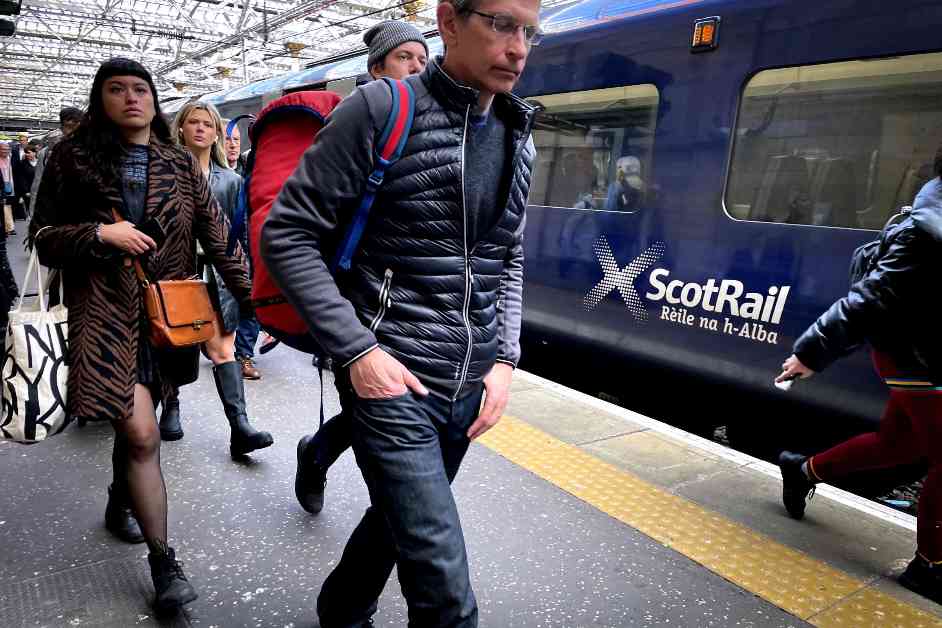ScotRail Faces Backlash After Peak Fare Removal Scheme Scrapped
The recent decision by ScotRail to abolish the peak fare removal scheme has sparked outrage among politicians and passengers alike. Scottish Labour has released figures showing a significant increase in passenger numbers during peak periods, with a staggering 40% rise observed during the pilot scheme, which concluded on Friday.
Peak Fare Reintroduction: Impact on Commuters
As the peak fare removal scheme comes to an end, commuters are bracing themselves for a steep increase in ticket prices. The cost of an anytime return ticket between Glasgow and Edinburgh is set to almost double, soaring from £16.20 to £31.40. This sudden hike in fares has left many Scots feeling frustrated and concerned about the affordability of their daily commute.
Scottish Labour’s Findings: Passenger Numbers Surge
According to data released by Scottish Labour, a total of 25,250,045 passengers traveled during peak times between October 2022 and July 2023, before the introduction of the peak fare removal scheme. In stark contrast, the number of passengers during peak times between October 2023 and July 2024, when the scheme was in place, surged to 35,009,817 – marking a remarkable 39% increase. These figures highlight the significant impact of the pilot scheme on passenger numbers and the affordability of rail travel for Scots.
Political Criticism: SNP’s Handling of Rail Fares
Sarah Boyack MSP, the Net Zero spokesperson for Scottish Labour, has criticized the SNP-run government for its decision to scrap the peak fare removal scheme. She accused the government of sabotaging the initiative and expressed concerns that many commuters may resort back to using cars, undermining the SNP’s climate targets. Boyack emphasized the importance of affordable and reliable rail services for Scotland’s sustainability goals, calling for a reconsideration of the decision to hike rail fares.
Transport Scotland’s Response: Misleading Figures?
In response to Scottish Labour’s findings, Transport Scotland has dismissed the data as misleading. The agency clarified that during the pilot scheme, both peak and off-peak tickets were priced the same and could be used interchangeably. Therefore, the figures provided by Scottish Labour do not accurately reflect the actual travel patterns of passengers. Transport Scotland highlighted the need for a comprehensive analysis of the impact of the peak fare removal scheme, taking into account factors such as marketing efforts and passenger behavior.
First Minister’s Justification: Financial Constraints
First Minister John Swinney defended the decision to reintroduce peak fares, citing financial constraints faced by the government. Swinney explained that despite the positive outcomes of the pilot scheme, the resources needed to sustain it were not feasible given the current financial pressures. While acknowledging the benefits of the initiative, Swinney emphasized the need for a balanced approach to public transportation funding to meet the diverse needs of commuters and the economy.
Union Concerns: Impact on Workers and Climate Goals
Union leaders have expressed concerns about the implications of scrapping the peak fare removal scheme on workers and Scotland’s climate goals. Kevin Lindsay, the Scottish organizer for the Aslef drivers’ union, criticized the decision as short-sighted and detrimental to both workers and the environment. Lindsay highlighted the importance of affordable rail travel in promoting modal shift from road to rail and reducing CO2 emissions. He urged the government to reconsider its stance and prioritize investments in sustainable transportation solutions to support economic growth and environmental sustainability.
Temporary Timetable: ScotRail’s Interim Solution
While peak fares are set to be reintroduced, ScotRail will continue to operate on a temporary timetable as negotiations with drivers progress. The temporary schedule is expected to remain in place until October 6, following the acceptance of the latest pay offer by Aslef members. Despite the ongoing disruptions, ScotRail remains committed to providing essential rail services to passengers while addressing the challenges posed by the peak fare removal scheme’s discontinuation.
In Conclusion
The decision to scrap the ScotRail peak fare removal scheme has stirred controversy and debate among stakeholders in Scotland. While Scottish Labour has highlighted the significant increase in passenger numbers during the pilot scheme, Transport Scotland has raised concerns about the accuracy of the data presented. As the government faces financial constraints and pressure to meet climate targets, the future of rail fares and sustainability initiatives remains uncertain. Ultimately, the impact of peak fare reintroduction on commuters, workers, and the environment will shape the discourse surrounding public transportation policies in Scotland.
































